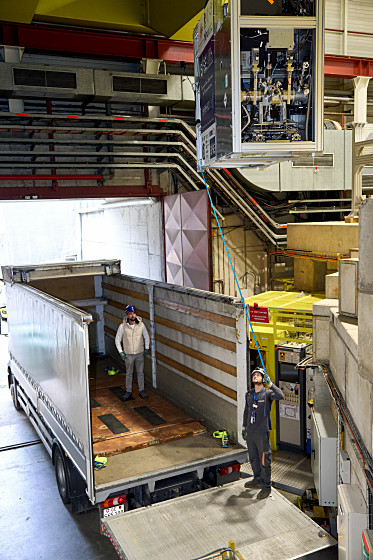CERN successfully carries protons by truck to realize 'long-distance transport of antimatter', carrying 100 protons and traveling more than 3 km at a maximum speed of 42 km/h without any loss

By CERN
A paper titled ' Proton transport from the antimatter factory of CERN ' written by a research team from the European Organization for Nuclear Research (CERN) was published in Nature on May 14, 2025. According to the paper, CERN successfully transported about 100 protons on a truck for more than 3 km. It is hoped that in the future, antimatter will be able to be transported to another research facility with advanced equipment.
Proton transport from the antimatter factory of CERN | Nature

CERN's antiproton decelerator can produce antimatter such as antihydrogen atoms and antiproton helium atoms, and researchers from around the world, including Japan, are conducting research on antimatter at CERN. However, there is a problem with CERN's experimental facility: the magnetic field generated when creating antimatter affects experiments on antimatter. To solve this problem, the research team has been developing a method to safely transport antimatter outside CERN.
Below is an image of the 'BASE-STEP' trapping system developed by the research team to confine antimatter. The proton cloud of antiprotons can be trapped in the cylindrical part.

BASE-STEP will be housed in a 2m long transport frame surrounded by superconducting magnets, which also houses a control PC and an uninterruptible power supply (UPS), with a total weight of 850-900kg.

CERN is conducting
In the paper published this time, they attempted to transport a proton cloud containing 100 protons as a preliminary experiment to transporting antimatter. In the transport experiment, the proton cloud was first confined in BASE-STEP and stored in a transport frame. The transport frame was then loaded onto a trailer and transported by a crane from inside the experimental site, where the decelerator is located, to the entrance where the truck was waiting.

The transport frame is being loaded onto a truck. Note that this photo was taken during the '70 proton transport experiment' conducted in 2024, not during this experiment.

By CERN
The truck carrying the proton cloud then circled the CERN site and returned it safely to its original experimental site. The distance traveled was 3.72 km, and the truck's top speed reached 42.2 km. BASE-STEP successfully maintained ultra-high vacuum and ultra-low temperatures during the journey for approximately 1 hour and 54 minutes, with no particle loss.

The research team evaluated this result as 'improved in terms of transport distance, particle number, and stability compared to the 2024 experiment, and is one step closer to realizing antiproton transport.' In the future, they plan to transport antimatter from CERN in Switzerland to Heinrich Heine University in Germany. Heinrich Heine University is currently building an antimatter experimental facility, which will enable antimatter to be measured with more than 100 times the accuracy. In the long term, it is expected that parallel measurements will be possible at multiple experimental facilities.
Related Posts:
in Science, Posted by log1o_hf







